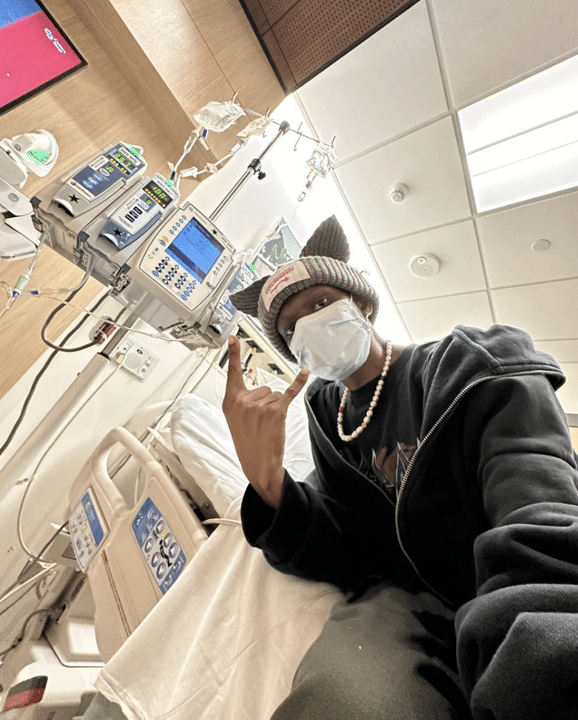
Soulful singer, Brian McKnight’s son, Niko McKnight, passed away on Thursday after a years-long battle with Stage 4 colon cancer. He was 32.
Niko’s mother and Brian’s ex-wife, Julie McKnight, confirmed the tragic news in a statement on social media, writing, “Nikolas was a cherished husband, son, brother, grandson, uncle, and nephew whose warmth, laughter, and love touched the lives of all who knew him. Nikolas was a self taught artist of music and photography. His passing is an immeasurable loss to his family and all those who held him dear.”
After asking for “privacy and continued prayers,” Julie concluded the statement by writing, “Mama Bear and the entire family appreciate the outpouring of love and support from friends, fans, and the public.”
Niko was a singer, guitarist and photographer. Growing up, he and his older brother Brian made a handful of public appearances alongside his father and performed alongside him as he and Brian Jr. promoted their group MCKNIGHT.
Since then, Brian, 55, has been open about his complicated relationship with his eldest children (he has seven total, including two stepchildren) and addressed the estrangement in 2019.
At the time, he noted that he had “been there for my children every step of the way until recently,” clarifying, “I’m not abandoning them. We’re estranged.”
The “One Last Cry” singer made headlines back in April 2024 when he admitted on an Instagram Q&A session that he doesn’t claim his four oldest biological children, calling them “products of sin.”
Niko, in a January 2024 Instagram post, originally revealed his cancer diagnosis, which began by writing “everyone’s been asking – here we go.”
He continued, “your boy got the big C • it’s beeen one hell of a ride so far but things are looking better now than they were before so cheers to that. shout out to everyone in my corner and a super shoutout to my wife @phoenixelbow for saving my life (that’s a story for another day) let’s keep this momentum going and keep one prayer in the chamber for me yall. s—s gonna get better, i know it. also, don’t treat me different. i need looooove at all times.”
Then, in December, he shared on Instagram that he had been “feeling the best I’ve felt since coming home from the hospital last year.”
Colorectal Cancer Rates in Young Black Men is Rising
While colorectal cancer isn’t as common in people under the age of 50 as it is in older people, it’s not as uncommon as many people might think. In 2020, about 12% of colorectal cancers – about 18,000 cases – will be diagnosed in people under the age of 50 in the US.
What’s more, while rates of colorectal cancer have been falling in older age groups in recent years, they’ve actually been rising among younger people. Colorectal cancer is on the rise in people under 35.
Young people often aren’t thinking about cancer, so they may be more likely to ignore symptoms, and they are years away from regular screening exams that might catch the disease.
Symptoms to Look For:
Changes in bowel habits – This can include more frequent or less frequent bowel movements, a change in the consistency of stool, or a feeling that the bowel doesn’t empty completely.
Rectal bleeding or blood in the stool – Blood may appear bright red, or the stool may look dark brown or black.
Narrow or ribbon-like stools – This indicates a narrowing of the colon.
Urge to defecate when there is no need – This may be a sign of a tumor obstructing the colon.
Abdominal pain or cramping – This can be a persistent pain or cramping in the lower abdomen.
Weight loss without trying – Unexplained weight loss is a common symptom of colorectal cancer.
Fatigue or weakness – Feeling tired or weak, especially if it doesn’t improve with rest, can be a sign of colorectal cancer.
Bloating or gas – Persistent bloating or gas pain in the abdomen.
Change in appetite – Loss of appetite or a change in appetite.

Colorectal cancer also disproportionately affects the Black community, where the rates are the highest of any racial/ethnic group in the US. African Americans are about 20% more likely to get colorectal cancer and about 40% more likely to die from it than most other groups.
The reasons for the differences are complex, but they largely reflect differences in risk factors and in health care access. This disparity highlights the importance of early screening and awareness among this population.
Early Screening:
The American Cancer Society recommends that Black men begin colorectal cancer screening at age 45, according to Norton Healthcare.
Routine Screening:
Black men should undergo routine colorectal cancer screening using methods like colonoscopy, FIT, or sigmoidoscopy.
What Kind of Screening Should You Get?
Broadly, there are two kinds: imaging, like colonoscopy, and stool-based tests. Stool-based kits need to be done every year or every three years, depending on the test. If they are positive for cancer, they still need to be followed up with a colonoscopy.
Stool-based tests are good at detecting cancer. But they are not as good at detecting polyps that can become cancer.
Colonoscopies can detect polyps and also remove them. So, a colonoscopy can not only find cancer, but actually prevent it in the first place. A colonoscopy only needs to be done every 10 years if no polyps are found.
However, the best screening test is the one you’ll actually get, whether it’s an imaging test or a stool test.
Protecting the Legacy of Niko McKnight
Brian’s brother Claude shared the news of his nephew’s passing in a TikTok, where he spoke to Niko’s legacy — and addressed the “family drama.”
Claude captioned the video, “I’m devastated at my nephews’ passing. If you comment please do do in love, and NOT at what you may have heard about the relationship my brother had/has with his kids. Thank you.”
He added, “He’d been bravely battling cancer for the last two years or so and have a lot of feelings right now… Niko was one of those amazing kids who was quirky and curious and ridiculously talented. Amazing singer and amazing guitar player. Had a great eye as a photographer and just one of those kids that at least in my estimation of somebody you always wanted to be around and so it really sucks that he’s no longer with us.”









